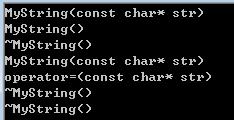您好,登錄后才能下訂單哦!
您好,登錄后才能下訂單哦!
這篇文章給大家分享的是有關C++句柄類的示例分析的內容。小編覺得挺實用的,因此分享給大家做個參考,一起跟隨小編過來看看吧。
之前介紹了關于C++代理類的使用場景和實現方法,但是代理類存在一定的缺陷,就是每個代理類會創建一個新的對象,無法避免一些不必要的內存拷貝,本篇文章引入句柄類,在保持代理類多態性的同時,還可以避免進行不不要的對象復制。
我們先來看一個簡易的字符串封裝類:MyString,為了方便查看代碼,將函數的聲明和實現放到了一起。
class MyString
{
public:
// 默認構造函數
MyString()
{
std::cout << "MyString()" << std::endl;
buf_ = new char[1];
buf_[0] = '\0';
len_ = 0;
}
// const char*參數的構造函數
MyString(const char* str)
{
std::cout << "MyString(const char* str)" << std::endl;
if (str == nullptr)
{
len_ = 0;
buf_ = new char[1];
buf_[0] = '\0';
}
else
{
len_ = strlen(str);
buf_ = new char[len_ + 1];
strcpy_s(buf_, len_ + 1, str);
}
}
// 拷貝構造函數
MyString(const MyString& other)
{
std::cout << "MyString(const MyString& other)" << std::endl;
len_ = strlen(other.buf_);
buf_ = new char[len_ + 1];
strcpy_s(buf_, len_ + 1, other.buf_);
}
// str1 = str2;
const MyString& operator=(const MyString& other)
{
std::cout << "MyString::operator=(const MyString& other)" << std::endl;
// 判斷是否為自我賦值
if (this != &other)
{
if (other.len_ > this->len_)
{
delete[]buf_;
buf_ = new char[other.len_ + 1];
}
len_ = other.len_;
strcpy_s(buf_, len_ + 1, other.buf_);
}
return *this;
}
// str = "hello!";
const MyString& operator=(const char* str)
{
assert(str != nullptr);
std::cout << "operator=(const char* str)" << std::endl;
size_t strLen = strlen(str);
if (strLen > len_)
{
delete[]buf_;
buf_ = new char[strLen + 1];
}
len_ = strLen;
strcpy_s(buf_, len_ + 1, str);
return *this;
}
// str += "hello"
void operator+=(const char* str)
{
assert(str != nullptr);
std::cout << "operator+=(const char* str)" << std::endl;
if (strlen(str) == 0)
{
return;
}
size_t newBufLen = strlen(str) + len_ + 1;
char* newBuf = new char[newBufLen];
strcpy_s(newBuf, newBufLen, buf_);
strcat_s(newBuf, newBufLen, str);
delete[]buf_;
buf_ = newBuf;
len_ = strlen(buf_);
}
// 重載 ostream的 <<操作符 ,支持 std::cout << MyString 的輸出
friend std::ostream& operator<<(std::ostream &out, MyString& obj)
{
out << obj.c_str();
return out;
}
// 返回 C 風格字符串
const char* c_str()
{
return buf_;
}
// 返回字符串長度
size_t length()
{
return len_;
}
~MyString()
{
delete[]buf_;
buf_ = nullptr;
}
private:
char* buf_;
size_t len_;
};看一段測試程序
#include "MyString.h"
int _tmain(int argc, _TCHAR* argv[])
{
MyString str1("hello~~");
MyString str2 = str1;
MyString str3 = str1;
std::cout << "str1=" << str1 << ", str2=" << str2 << ", str3=" << str3;
return 0;
}輸出內容如下:

可以看到,定義了三個MyString對象,str2和str3都是由str1拷貝構造而來,而且在程序的運行過程中,str2和str3的內容并未被修改,但是str1和str2已經復制了str1緩沖區的內容到自己的緩沖區中。其實這里可以做一個優化,就是讓str1和str2在拷貝構造的時候,直接指向str1的內存,這樣就避免了重復的內存拷貝。但是這樣又會引出一些新的問題:
1. 多個指針指向同一塊動態內存,內存改何時釋放?由誰釋放?
2. 如果某個對象需要修改字符串中的內容,該如和處理?
解決這些問題,在C++中有兩個比較經典的方案,那就是引用計數和Copy On Write。
在引用計數中,每一個對象負責維護對象所有引用的計數值。當一個新的引用指向對象時,引用計數器就遞增,當去掉一個引用時,引用計數就遞減。當引用計數到零時,該對象就將釋放占有的資源。
下面給出引用計數的一個封裝類:
class RefCount
{
public:
RefCount() : count_(new int(1)){};
RefCount(const RefCount& other) : count_(other.count_)
{
++*count_;
}
~RefCount()
{
if (--*count_ == 0)
{
delete count_;
count_ = nullptr;
}
}
bool Only()
{
return *count_ == 1;
}
void ReAttach(const RefCount& other)
{
// 更新原引用計數的信息
if (Only())
{
delete count_;
}
else
{
--*count_;
}
// 更新新的引用計數的信息
++*other.count_;
// 綁定到新的引用計數
count_ = other.count_;
}
void MakeNewRef()
{
if (*count_ > 1)
{
--*count_;
count_ = new int(1);
}
}
private:
int* count_;
};Copy On Write:就是寫時復制,通過拷貝構造初始化對象時,并不直接將參數的資源往新的對象中復制一份,而是在需要修改這些資源時,將原有資源拷貝過來,再進行修改,就避免了不必要的內存拷貝。
下面的代碼是完整的句柄類MyStringHandle。每一個句柄類,都包含一個引用計數的類,用來管理和記錄對MyString對象的引用次數。
class MyStringHandle
{
public:
MyStringHandle() : pstr_(new MyString){}
// 這兩種參數的構造函數必須構造一個新的MyString對象出來
MyStringHandle(const char* str) : pstr_(new MyString(str)) {}
MyStringHandle(const MyString& other) : pstr_(new MyString(other)) {}
// 拷貝構造函數,將指針綁定到參數綁定的對象上,引用計數直接拷貝構造,在拷貝構造函數內更新引用計數的相關信息
MyStringHandle(const MyStringHandle& ohter) : ref_count_(ohter.ref_count_), pstr_(ohter.pstr_) {}
~MyStringHandle()
{
if (ref_count_.Only())
{
delete pstr_;
pstr_ = nullptr;
}
}
MyStringHandle& operator=(const MyStringHandle& other)
{
// 綁定在同一個對象上的句柄相互賦值,不作處理
if (other.pstr_ == pstr_)
{
return *this;
}
// 若當前引用唯一,則銷毀當前引用的MyString
if (ref_count_.Only())
{
delete pstr_;
}
// 分別將引用計數和對象指針重定向
ref_count_.ReAttach(other.ref_count_);
pstr_ = other.pstr_;
return *this;
}
// str = "abc" 這里涉及到對字符串內容的修改,
MyStringHandle& operator=(const char* str)
{
if (ref_count_.Only())
{
// 如果當前句柄對MyString對象為唯一的引用,則直接操作改對象進行賦值操作
*pstr_ = str;
}
else
{
// 如果不是唯一引用,則將原引用數量-1,創建一個新的引用,并且構造一個新的MyString對象
ref_count_.MakeNewRef();
pstr_ = new MyString(str);
}
return *this;
}
private:
MyString* pstr_;
RefCount ref_count_;
};看一段測試程序:
int _tmain(int argc, _TCHAR* argv[])
{
// 構造MyString
MyStringHandle str1("hello~~");
// 不會構造新的MyString
MyStringHandle str2 = str1;
MyStringHandle str3 = str1;
MyStringHandle str4 = str1;
// 構造一個空的MyString
MyStringHandle str5;
// 將str1賦值到str5,不會有內存拷貝
str5 = str1;
// 修改str5的值
str5 = "123";
str5 = "456";
return 0;
}
感謝各位的閱讀!關于“C++句柄類的示例分析”這篇文章就分享到這里了,希望以上內容可以對大家有一定的幫助,讓大家可以學到更多知識,如果覺得文章不錯,可以把它分享出去讓更多的人看到吧!
免責聲明:本站發布的內容(圖片、視頻和文字)以原創、轉載和分享為主,文章觀點不代表本網站立場,如果涉及侵權請聯系站長郵箱:is@yisu.com進行舉報,并提供相關證據,一經查實,將立刻刪除涉嫌侵權內容。